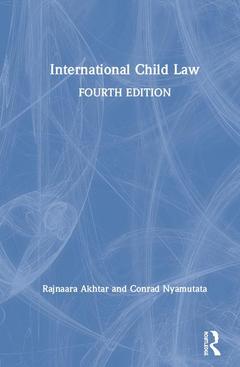Description
International Child Law (4th Ed.)
Authors: Akhtar Rajnaara, Nyamutata Conrad, Faulkner Elizabeth
Language: English
Subjects for International Child Law:
Keywords
Intercountry Adoption; Childhood; Inter-country Adoption; Children’s Rights; Hague Convention; UNICEF; Optional Protocol; Human Rights; International Humanitarian Law; autonomy; voice of the child; ILO Convention; decision-making; Child Labour Convention; Optional Protocol on a Communications Procedure; Special Rapporteur; International customary law; Hague Conference; International organisations; International Child Law; The United Nations; Private International Law; Millennium Development Goals; Antonio Guterres; Child’s Habitual Residence; The Hague Conference on Private International Law; Child Sex Tourism; The International Criminal Court; Committee’s Concluding Observations; Human rights protection; Habitual Residence; UN Convention on the Rights of the Child; Child Sexual Exploitation; Child labour; Minimum Age Convention; causes of child labour; International Parental Child Abduction; exploitative child labour; Abduction Convention; modern slavery; Tackle Child Sexual Exploitation; forced labour; Concluding Observations; forced marriage; Prospective Adoptive Parents; Cultural relativism; Dominic Ongwen; Sale of Children; Committee on the Rights of the Child; Syrian war; Brexit; Sexual Exploitation; trafficking of children; human trafficking; Children and armed conflict; children associated with armed forces; International Criminal Tribunal for the Former Yugoslavia; International Criminal Tribunal for Rwanda; Special Court for Sierra Leone; Indigenous children; ILO Indigenous and Tribal Peoples Convention; child law; children's rights
37.68 €
In Print (Delivery period: 14 days).
Add to cartPublication date: 04-2020
· 15.6x23.4 cm · Paperback
135.96 €
In Print (Delivery period: 14 days).
Add to cartPublication date: 04-2020
· 15.6x23.4 cm · Hardback
Description
/li>Contents
/li>Readership
/li>Biography
/li>
This book examines the rights of the child using the global framework of the United Nations International Convention on the Rights of the Child 1989. Analysing both public and private international legal aspects, this cross-disciplinary text promotes a holistic understanding of the ongoing development of child law, children?s rights and the protection of the child. In-depth analyses of the following topic areas are included: Childhood in the digital age; Child labour; International parental child abduction; Inter-country adoption; Sexual exploitation; Children and armed conflict; and Indigenous children. These topics are contextualised with further chapters on the concept of childhood and children?s rights, the international legal framework in which the Convention operates and a substantive chapter on the Convention itself.
This fourth edition has been updated and revised, including a new chapter dealing with issues arising from childhood in the age of unprecedented digital technological advancements; a crucial issue for childhood experiences in modern times. This edition also includes new case studies, recent legal developments in the field of international child law, and inclusion of broader scholarship to capture diverse views on international law and child law. The aim of this book is to provide the reader with an accessible, informed, critical and scholarly account of the international law framework relating to children.
Drawing on a range of legal and other disciplines, this book remains a valuable resource for those in the course of study and research in this area.
1. Childhood and children’s rights; 2. Introduction to international law sources and institutions; 3. The United Nations Convention on the rights of the child; 4. Childhood in the digital age; 5. Child labour; 6. International parental child abduction; 7. Inter-country adoption; 8. Sexual exploitation; 9. Children in armed conflict; 10. Indigenous children
Dr Rajnaara C. Akhtar is a Senior Lecturer at De Montfort University, UK. Her main teaching and research interests include family law, international law, child law, gender and law and human rights. She received her PhD from the University of Warwick in 2013, and holds a Masters degree in Human Rights Law from the University of Nottingham.
Dr Conrad Nyamutata is a lecturer at De Montfort University, UK. His main teaching and research interests include broadly public international law, with specialisms in international child law, international human rights law, international humanitarian law and media and mass communications. He holds an MA in Mass Communication (University of Leicester) and an LLM in international human rights and international humanitarian law from Lancaster University. He received his PhD at De Montfort University in 2015.




